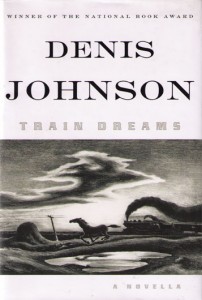Book Review: Denis Johnson’s Plays in Verse — The Art of Talking with the Devil
One answer to the question of “Why two plays in verse?” might be that Denis Johnson is a writer relentlessly in pursuit of new forms, and new formal challenges—a literary daredevil always looking for a new vehicle to take for a thrill ride.
Soul of a Whore and Purvis: Two Plays in Verse by Denis Johnson. Farrar, Strauss and Giroux, 240 pp., $20.
Reviewed by Anthony Wallace
Soul of a Whore, Purvis, and Denis Johnson’s Genial Genealogy
Thinking about Denis Johnson’s recently published Two Plays in Verse makes me think of T. S. Eliot, whose literary career took an odd turn in this direction after the publication of The Four Quartets, although he’d been moving in that direction since the twenties. It seems to me that Johnson has used the term in his title deliberately to evoke a connection with Eliot, but such a connection would be there whether he intended to evoke one or not. After all, how many modern writers have written one or more “plays in verse”? If we know why such a giant of modern poetry would want to write in this odd and seemingly anachronistic form (see “Poetry and Drama” and “The Possibility of a Poetic Drama”), what about Denis Johnson? And if we know why Johnson might attempt such a thing, can we understand the connection between these two plays and his best works of fiction, which is where his literary reputation lies and what most of his readers are interested in?
Denis Johnson is not exactly a giant, in the same sense that Cormac McCarthy, say, or J. M. Coetzee are living literary giants, but he always seems to be slouching a little closer toward gianthood. As it stands, Johnson is a well known, well respected, and well published writer who won the 2007 National Book Award for his Vietnam War novel, Tree of Smoke. He has published poetry, novels, short stories, plays in prose, and reportage—and now his latest, Two Plays in Verse, both of which were written before Tree of Smoke and only now published, possibly because the publisher can now print “Winner of the National Book Award” on the front cover.
One answer to the question of “Why two plays in verse?” might be that Denis Johnson is a writer relentlessly in pursuit of new forms, and new formal challenges—a literary daredevil always looking for a new vehicle to take for a thrill ride. This is true not just of the large genres I’ve mentioned, but also of genres within those genres: A “California Gothic” novel, a detective novel, a war novel, an historical novel(ella), a collection of interrelated stories that also functions as a novel. In developing his fiction in this formally adventurous way while maintaining a through-line of favorite themes and an identifiable and very readable literary style, Johnson is one of those contemporary writers keeping alive the ideas and ideals of twentieth century modernism that many of us came up with and are still held in thrall by (all right, I’ll speak for myself).
In writing these plays in a way that takes us in a fairly straight line to one of the great innovators of twentieth century modernism, is Johnson simply doing more of the same, and if so why Eliot, and why this oddest of possible turns? Certainly Johnson’s themes have been in sync with Eliot’s all along, although he’d seem to be a much more profane practitioner. Among those themes are sin, guilt, the possibility of hell, the countervailing possibilities of grace and redemption, the dead hand of the past and how we might lift it from our living cadavers. As I pointed out in my review of Train Dreams, these are also favorite themes of Flannery O’Connor and Cormac McCarthy. Where I described that line of descent as Irish Catholic, I’d describe this one, because of Eliot, as Anglo-Catholic, which amounts almost to the same thing, I suppose, theologically if not culturally speaking.
 Johnson has linked O’Connor and Eliot before, with the ending of Tree of Smoke, which refers to the Doctrine of Universal Salvation promulgated by Saint Julian of Norwich. Eliot makes important references to her in The Four Quartets, and O’Connor even created a character named Julian, the protagonist of the title story of her second collection, Everything that Rises Must Converge. We also know that O’Connor looked to Eliot as a model for what she intended to become: a writer with spiritual concerns based on a specific understanding and practice of Christianity who was trying to reach a broad-based, secular readership in a broadly secular age. While Johnson, as far as I know, is not a practicing Catholic or Episcopalian, his thematic and philosophical concerns are essentially the same. He is interested in conducting the same investigation, it seems to me, only from the secular side of the street. Soul of a Whore and Purvis are consistent with this way of looking at Johnson’s work, only he has mixed politics and religion more overtly than in his fiction—although the plays might cause us to look back on some of the fiction and see this intersection as more important than it might have seemed the first time around.
Johnson has linked O’Connor and Eliot before, with the ending of Tree of Smoke, which refers to the Doctrine of Universal Salvation promulgated by Saint Julian of Norwich. Eliot makes important references to her in The Four Quartets, and O’Connor even created a character named Julian, the protagonist of the title story of her second collection, Everything that Rises Must Converge. We also know that O’Connor looked to Eliot as a model for what she intended to become: a writer with spiritual concerns based on a specific understanding and practice of Christianity who was trying to reach a broad-based, secular readership in a broadly secular age. While Johnson, as far as I know, is not a practicing Catholic or Episcopalian, his thematic and philosophical concerns are essentially the same. He is interested in conducting the same investigation, it seems to me, only from the secular side of the street. Soul of a Whore and Purvis are consistent with this way of looking at Johnson’s work, only he has mixed politics and religion more overtly than in his fiction—although the plays might cause us to look back on some of the fiction and see this intersection as more important than it might have seemed the first time around.
Soul of a Whore, the Postmodern Blender, and a Whole Bunch of Republicans
In “Poetry and Drama,” Eliot writes that a play written in verse “must justify itself dramatically, and not merely be fine poetry shaped into dramatic form. From this, it follows that no play should be written in verse for which prose is dramatically adequate. And from this it follows, again, that the audience, its attention held by the dramatic action, its emotions stirred by the situation between the characters, should be too intent upon the play to be wholly conscious of the medium” (i. e., that the play has been written in verse).
If we think about Two Plays in terms of the above quotation, two things become apparent: the use of blank verse seems justified in that it produces at least a different effect than would the same material written in prose; on the other hand, it was impossible for me to read the plays without constantly bumping into the iambic pentameter of which they are made. That is, as a reader, not a viewer, I could see that the verse was doing something to the material worth thinking about, but I frequently felt it as an impediment between me and the characters and their words and actions. The meter is labored; the rhyming, when it occurs, is obvious or strained. The dialogue sometimes reads like a libretto from the musical theater:
Masha: Who’s the peep show? Is it really me?
I strut along and toss down feed to you.
You hunch there with your glass of screw-top wine
And all the feelings naked in your face.
You gobble me down with your eyes, but you don’t see
me.
You see the act, your see your fantasy
And not the person working at a job.
You see me panting for you but I’m bored,
My ankles hurt, my car got repossessed,
I’d like to move because my rickety
Apartment’s on the building’s sunny side—
The prancing slut is prancing in your head.
This is important to note and seems deliberate on Johnson’s part. I say that because Denis Johnson is a wonderfully talented prose stylist who has both a keen ear and a keen eye: for detail, for dialogue, for rhythm, for ease and naturalness on the page. Johnson’s verse screams to be noticed, and one thing I wondered throughout reading both plays was how the actors would handle this aspect of their roles, and if they would downplay it or go with it. It seems to me they would have to go with it because it is part and parcel of the freewheeling exaggeration of both works: the plays are over the top in just about every way imaginable, and it puzzles me that most reviewers seem not completely aware of this fact. Indeed, the reviews I’ve read talk about qualities the plays have in common with Johnson’s fiction—characters on the fringe, a preoccupation with American history as mythology, themes of sin and redemption, a yearning for spiritual transcendence—without acknowledging that Johnson in his best fiction always seems to know exactly how far to go, from the standpoint of the prose, the characterization, the bigness of his themes, etc.
I find in Johnson’s best work a desire (even a compulsion) to push limits balanced by an admirable sense of restraint and control. That is certainly true of Jesus’ Son, Tree of Smoke, and the most recently published Train Dreams (originally published in The Paris Review in 2002). It’s true that Already Dead is looser, less disciplined, more broadly funny—a bit more like the plays we’re discussing here. It is also true that Resuscitation of a Hanged Man is a detective novel that verges on parody, somewhat po-mo, not my favorite thing by Johnson but useful to us here because we can see the same impulse toward broad humor combined with poetically heightened language and imagery—an outsized strategy that at its best can produce a giddy, off-kilter fictional world in which reality and unreality begin to trade places.

A scene in the 2003 premiere of Denis Johnson’s SOUL OF A WHORE at the Campo Santo theater company. Photo: Jeff Fohl.
But back to the plays. Soul of a Whore (2003) is a rollicking house party of play next to the (relatively) more austere, pensive (but just as silly in places) Purvis. Johnson seems to want to make it hard on readers by giving names of characters but not otherwise identifying who they are or what relation they have to one another. There is also very little stage direction to supply information as we shift from scene to scene. The result is a play to puzzle through, even struggle through, just to figure out what is going on and to keep all the characters straight. The “verse” serves to slow things down, to keep us focused on lines in which many things are going on, both on the stage and in terms of poetic allusion, musicality, etc. Plays are usually easier to read than novels, but I found both plays and especially Soul more difficult to read than Johnson’s novels, let alone most standard plays in prose.
This quality might seem to justify publishing the plays for a larger audience than people involved with the theater—that is, that they are “literature” and should be read as such. But both plays, for all that is going on line by line, seem oddly incomplete on the page. Soul of a Whore is the longer and more difficult read, and some reviewers have said that it is the better of the two plays, but that might be because it seems to give us more than does Purvis. On the other hand, Soul of a Whore is also something of a jumble: excessive in all sorts of ways—including healthy portions of middle school vulgarity—difficult to follow or even determine a central plotline, difficult to get a bead on the characters. Capital punishment, the religious right, and good old-fashioned peckerwood racism are thrown into the postmodern blender—along with Eliotic “mythic method” names like John and Bess Cassandra and pop-culture references too numerous to catalogue—the whole thing set in glutinous blank verse and served up like a greasy but relentlessly flavorful plate of chicken-fried steak. Indeed, the whore in question in this amusingly frustrating mashup is named “Masha.” Johnson seems to take enjoyment in the archness of the enterprise, including the low-brow humor, the broad condemnations, and the seeing exactly how much he can get away with.
Soul of a Whore is difficult to summarize, since there is no clearly defined plot or source of conflict or central action—all this is up to interpretation, though the central characters and key moments come better into focus on a second reading—but the play can be described in terms of where the scenes are set: a Greyhound bus terminal across the street from a Texas penitentiary, where typically marginal characters gather and where an exorcism is finally performed on the stripper Masha; a hospital room where a patient appears to be in terminal vegetation and where it seems the family has gathered to witness the pulling of the plug and where the talented con-man preacher Bill Jenks ( a man of God so fake he has to be real) has a conversation with a demon inhabiting Simon, the man in the coma; the Huntsville, Texas penitentiary where Bess Cassandra will be executed for killing her child, “squishing little Amy with the car.” The play ends with the stripper Masha making a rousing speech that condemns capital punishment by glorifying it:
When Texas trips the lever of the blade
And that blade dives down through a killer’s neck,
And that neck pumps that evil blood six feet,
And that head goes rollin’ into the world,
What drives that blood is the beautiful heart of Texas,
And staring out of that head are the eyes of Texas,
The dead face of the killer we have killed—
This is the face of liberty and justice.
This is the beautiful face of liberty and justice!
At the 1992 Republican National Convention in Houston, Pat Buchanan sounded this alarm: “Friends, there is a religious war going on in the country. It is a cultural war, as critical to the kind of nation we shall be as the Cold War itself. For this war is for the soul of America.” Soul of a Whore seems to be Denis Johnson’s long, impassioned response to Buchanan’s remarks and everything in the Republican Party that has followed after them. This play represents the soul of America. This play represents the beautiful soul of America.
Helter-Skelter History and the Junior G-Men: Denis Johnson Refuses to Eat his Wheaties
Johnson continues to explore the layers and dimensions of American culture and history with Purvis (2006) by bringing in historically important figures. Purvis is comprised of seven scenes in reverse-chronological order. We might have to think for a minute (or a week) about who Melvin Purvis is, but we know who Lyndon Johnson and J. Edgar Hoover are, or were, and the play starts with those two almost-mythical figures playing gin rummy in the Oval Office, Johnson in his underwear, Hoover sipping sherry (of course). You can cut the corruption and cynicism with a knife, and if Johnson was spewing fire and brimstone from the bottom up in Soul of a Whore, he is doing so from the top down in Purvis:
Johnson: The South Carolina Criminal Justice Hall
Of Fame. The Elvis Purvis Gun Display!
—Elvis? That his name?
Hoover: His name was Melvin.
Johnson: I’ll be saying words in praise of him.
The nation sighs; let’s celebrate our heroes.
Purvis; Kennedy; Martin Luther King.
Hoover: We want straight arrows, Boy Scouts, true believers.
What we can’t abide are vivid heroes.
If a man should stand too high, well then,
We’ll lop him at the legs. As I did Purvis.
Johnson: A preacher ain’t nothing to fret you, Herr Director.
Preachers rise and fall.
Hoover: King’s dangerous.
Johnson: They sit themselves on golden toilets, wiping
Their holes with hunnerds, talking on two phones
While flying around in bright red airplanes.
Don’t pay no tax on half a cent of it,
Nobody says boo. What shoots ’em down?
What finally shoots ’em down? It’s good old poon,
The whores and mistresses and altar boys.
In imagining history in this way, Johnson is a bit like the callow narrator of Sherwood Anderson’s “I Want to Know Why.” How can people so high up act so low-down? is a question that runs through both plays.
Purvis is about Melvin Purvis, the famous FBI agent who brought down John Dillinger and Pretty Boy Floyd. The play offers a more coherent plot in that it follows keys scenes in Purvis’ life—whether he’s in the scenes or not—in reverse chronological order. Why Purvis to begin with? It seems that Melvin Purvis is the good, decent lawman who was finally corrupted by the system (as typified by the above passage), a well-intentioned crimefighter who gunned down the outlaws in cold blood, or had them gunned down, was driven from the Bureau by Hoover and for a time made his living as “the head of the ‘Junior G-man’ public relations campaign for Post Toasties cereal” (a Junior G-man badge in every box). Murder, Johnson seems to be saying in both plays, is murder, no matter who commits it. Tabloid culture is also tabloid culture, no matter who participates in it. Morality gleaned from a cereal box is… well, you get the idea.
The problem is that Johnson himself (Denis, not Lyndon) seems to be engaging in cereal box morality. The satire is as broad as the targets, the judgments as stark; the vision of America worked out in both plays seems relentlessly dark, cynical, pessimistic. This aspect is not typical of Johnson, who likes to take us all the way down but then give us something to come back up on. Fuckhead in Jesus’ Son really does seem to join the human community by the end of the book, and the human community really does seem to be human. The lady missionary at the end of Tree of Smoke sees that “all will be saved,” a vision of universal salvation that might be read ironically but which Johnson asks us to believe in all the same. Robert Granier of Train Dreams lives a mostly unexamined life of almost complete anonymity, and his existence is affirmed as having value all the same. In Flannery O’Connor’s way of seeing things, balance is ultimately restored to a fallen world.
Denis Johnson has done something different here, and he needed to change genres in order to do it, and even to change genres twice, in a way. He seems to be testing the quality of the redemptions he has given us as well as his fictional characters through some literary via negativa in which the limits of his talent are tested along with his own qualified but poetic vision of spiritual transcendence. On one reading I have some idea of what the stakes of the game are, and why Johnson and his readership might want to play, but I’m not so sure of the outcome except that, artistically speaking, Denis Johnson has crossed a line. Like Goodman Brown, he has gone out into the woods and spoken with the devil, and these plays appear to be the result. That is a fanciful reading, to be sure, because we all know that grown men don’t lose their souls by writing “plays in verse,” or even put them at risk. We all know that. From here it’s an easy jump back to Eliot and the question of what we know, and how we know it, and who is doing the knowing to begin with—not to mention the corollary that, while many of us are trying to figure this stuff out, we’re rocketing straight to hell.
I suppose I like Purvis better, at least in part, because there is a hint that Johnson is giving us a way out—restoring a sense of balance to the fallen world of the play—and it is in the famous criminals who were hunted down and murdered by Purvis and the other “Government Men.” As in Johnson’s fiction, the low-down act in a way that lifts them up—and us along with them. At the end of the play, John Dillinger and Baby Face Nelson are holed up at the Bohemia Inn on Little Star Lake, Wisconsin, the inn surrounded by G-men.
G-Man’s Voice [O.S. through megaphone]: THE HOUSE IS
COMPLETELY SURROUNDED. GIVE IT UP.
AS SURE AS YOU’RE BORN, WE’RE GONNA GET
YOU.
DON’T TRY TO THWART THE LAW. WE JUST
KEEP COMING.
AS SURE AS YOU’RE IN THAT ROOM, WE’RE
GONNA GET YOU.
What’s of interest here is that the two men are no longer in the room, so that it is not certain they will be apprehended. Historically, the two men escaped and were later killed, but Johnson rewrites history by suggesting that John Dillinger retired from a life of crime after this final scrape with the law, and that another man—one with a much bigger dick—was mistaken for him and killed outside the Biograph Theater in Chicago. Johnson sides with the young men who will not be taken alive—think of James Cagney in White Heat and you’ll have an idea of what Johnson is going for here, at least in terms of pitch—and seems to suggest that they represent the true soul of America, the rebellious spirit that will fight to the death and that will not be broken by the infernal bureaucrats (represented by Hoover, Purvis, and the Federal Bureau of Investigation).
This seems to be a naïve position, and an absolute one, but I’d say that Denis Johnson is here investigating the very possibility of absolute values to balance against those of Pat Buchanan and the Tea Party (and whichever other contemporary authoritarians come to mind). In this play, both Purvis and Dillinger are broken by the system in different ways, and only Pretty Boy Floyd and Baby Face Nelson are affirmed as taintless and incorruptible: young men who will die for what they believe in, or at least what they believe against. To Johnson, the ordinary but brave young men who will fight in a Midwest corn field or in Vietnam rice paddy—or even, perhaps, on the grassy slopes of Lexington and Concord?—are the true and beautiful face of liberty and justice, the soul of America that all the stinking politicians and government men kill. The government men with their prisons and wars and false gods. The government men with their lies and their hypocrisy, the ones who want to keep everybody under control, either through mad ideology or the mad desire to make a buck. The government men and those they corrupt, who are more meretricious than the actual whores working the bus stations and titty bars of America. The money and power whores who are killing the soul of America.
This seems preposterously oversimplified, and intelligent readers may conclude that Denis Johnson should go back to writing important, prizewinning novels. The odd thing is that these plays were written before Tree of Smoke, and before the book publication of Train Dreams, which was nominated for a Pulitzer in 2011. With Train Dreams and now these two plays, Johnson seems to be doing something odd to the chronological integrity of his own work: messing with the history of his oeuvre even as in Purvis he has messed with American history. We are accustomed to reading an author’s work in its rightful chronological sequence as a kind of journey, and Johnson and his publishers have given us that journey out of order. Indeed, Tree of Smoke is the next-to-last new work Johnson has published (followed by the po-mo crime novel Nobody Move in 2008—a work that confused and annoyed a number of critics), and these two “plays in verse” not only lead up to that epic novel but also, oddly, come after it. This might be part of a complex game Johnson is playing, within these two plays and also within the body of his work; it also might be nothing more than the desire to cash in on his National Book Award and make a buck, Junior G-man style. Of course, from the standpoint of the modernist tendency to get readers moving and negotiating between positions, it might very well be both.
Thinking back to Tree of Smoke and the main character Skip Sands, I think again of Bobby Sands, the IRA prisoner who went on a hunger strike and starved himself to death for a political cause. Johnson’s plays in verse, in their extremity, seem almost to be a literary equivalent. And just like Bobby Sands facing down the entire British establishment, Johnson has us readers in something of a bind here. What will he do next? Where can he possibly go from here?
Tagged: Denis Johnson, Purvis, Soul of a Whore, Train Dreams, Tree of Smoke



